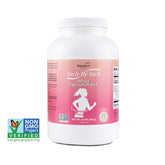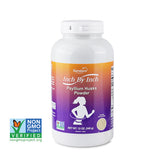Psyllium Husk: A Gut-Healthy Supplement with Cardiovascular and Blood Sugar Benefits

By Trisha Pasricha, MD
Published in The Washington Post – Ask the Doctor Column
In today’s world, where health and wellness are top priorities, the market is flooded with countless dietary supplements. Many of them may end up being a waste of money. However, according to Dr. Trisha Pasricha, an internal medicine physician and Harvard Medical School instructor who writes The Washington Post’s Ask the Doctor column, one supplement stands out.
When asked, “What is the one supplement you most often recommend to patients?” she pointed to psyllium husk—a natural fiber derived from the outer shell of Plantago ovata seeds.
What Makes Psyllium Husk Special?
Unlike many social media health trends lacking scientific backing, psyllium husk has been extensively studied and proven to provide multiple health benefits, including:
- Lowering cholesterol
- Regulating blood sugar levels
- Prolonging satiety
- Relieving both constipation and diarrhea
Psyllium husk is rich in arabinoxylan, a fiber that forms a gel-like substance when mixed with water. This unique property not only helps regulate digestion but also plays a key role in cholesterol metabolism and supports a healthy gut microbiome.
A Supplement Beyond Gut Health
Although psyllium husk is well known for improving digestive health, its benefits extend far beyond the gut.
1. Cardiovascular Health
Psyllium husk helps lower cholesterol levels in multiple ways, including altering gut microbiota and binding to bile acids. This process forces the liver to use more cholesterol to produce bile, effectively reducing the amount of cholesterol circulating in the blood.
A 2018 meta-analysis of 28 randomized controlled trials, involving nearly 1,900 participants, found that consuming 10.2 grams of psyllium daily for at least three weeks significantly reduced LDL cholesterol and apoB—both markers of heart disease risk. The average decrease in LDL cholesterol was approximately 13 mg/dL.
2. Blood Sugar Regulation & Satiety
Psyllium slows the absorption of glucose in the intestines, preventing blood sugar spikes and prolonging satiety.
In a randomized, double-blind controlled trial, participants who took 7.4 grams of psyllium in the morning reported feeling less hungry throughout the day, consuming fewer calories at subsequent meals, and experiencing improved blood sugar control. Another study found that consuming at least 10 grams of psyllium daily could lower hemoglobin A1C levels (a key indicator of long-term blood sugar levels) by 1.37 mmol/L.
3. Digestive Health
Psyllium’s gel-like consistency makes it a powerful regulator for both constipation and diarrhea.
- For constipation, psyllium draws water into the stool, making it bulkier and easier to pass.
- For diarrhea, it absorbs excess water, helping to firm up loose stools.
Because of this dual-action ability, psyllium is a first-line recommendation for irritable bowel syndrome (IBS) and fecal incontinence. Additionally, it has been shown to support gut health by reducing inflammation and promoting the production of beneficial short-chain fatty acids like butyrate.
How Much Psyllium Should You Take?
A typical dosage ranges from 10 to 15 grams per day (about 2 teaspoons), although some studies have observed benefits with doses up to 20 to 30 grams daily. It’s best to start small—around ½ teaspoon per day—and gradually increase over one to two weeks.
Since psyllium absorbs water to form a gel, it’s crucial to consume it with at least 8 ounces (240 mL) of water.
Are There Any Side Effects?
Psyllium is generally considered safe, but it’s always best to consult a doctor before starting any new supplement.
Potential side effects include:
- Mild bloating or gas (especially when starting at high doses)
- Loose stools (which usually subside as the body adjusts)
Psyllium allergy is extremely rare.
Final Thoughts for Patients
If you start taking psyllium daily, expect changes in your bowel habits—you may pass softer stools or go to the bathroom two to three times a day instead of just once.
These changes are a sign of improved gut health. In many cultures with fiber-rich diets, frequent bowel movements are considered completely normal. Unless it disrupts your daily routine, embrace this new pattern as part of a healthier you.
– By Trisha Pasricha, MD
Source: - KoreaTimes (미주한국일보)
[Nutrakore] Inch By Inch

![Inch By Inch (Psyllium Husks Powder) [Buy 4 Get 1 FREE] - Health Korea Shop](http://healthkoreashop.com/cdn/shop/files/health-korea-shop-default-title-inch-by-inch-psyllium-husks-powder-buy-4-get-1-free-26476880429165_165x.gif?v=1757024963)
![Inch By Inch (Psyllium Husks Powder) [Buy 4 Get 1 FREE] - Health Korea Shop](http://healthkoreashop.com/cdn/shop/files/health-korea-shop-default-title-inch-by-inch-psyllium-husks-powder-buy-4-get-1-free-26471389102189_165x.jpg?v=1757024971)
![Inch By Inch (Whole Psyllium Husks) [Buy 3 Get 1 FREE] - Health Korea Shop](http://healthkoreashop.com/cdn/shop/files/health-korea-shop-default-title-inch-by-inch-whole-psyllium-husks-buy-3-get-1-free-26471348764781_165x.jpg?v=1757024989)

![Inch By Inch (Organic Psyllium Husks Powder) [Buy 3 Get 1 FREE] - Health Korea Shop](http://healthkoreashop.com/cdn/shop/files/health-korea-shop-default-title-inch-by-inch-organic-psyllium-husks-powder-buy-3-get-1-free-26471394771053_165x.jpg?v=1757024965)
![Inch By Inch (Organic Psyllium Husks Powder) [Buy 3 Get 1 FREE] - Health Korea Shop](http://healthkoreashop.com/cdn/shop/files/health-korea-shop-default-title-inch-by-inch-organic-psyllium-husks-powder-buy-3-get-1-free-26471394803821_165x.png?v=1757025003)

